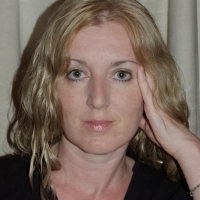Igor Ljubuncic is a physicist and a self-confessed Linux geek, amongst other things, but his real passion is writing. He is the author of The Betrayed, the first in the Lost Words fantasy series. Here’s a short taster to whet your appetite:
A war is brewing in the Realms. When the new religious sect of Feor from Caytor invades the Safe Territories, the home of the old gods, Commander Mali of Eracia scrambles to counter its advance. To that end, Adam, an Eracian prostitute who awaits hanging, is spared to join the army. In the Territories, a former criminal Ayrton and his young protégée Ewan face the threat of the invaders. Can the ruthless followers of Feor be stopped, and the old faith be saved?
* * *
Hi Igor, thanks for joining us.
Hi James, it’s an honor to be invited.
What first inspired you to start writing?
Uh-oh, a difficult question. I started writing at a very young age, probably seven or eight, although my first book, so to speak, did not come to life until three years later. It was a silly childhood thing, a ninja-flavored world adventure. I guess the early insipiration for that came from a weird combination of ninja comic books and the mystery revolving around them, Daniel Defoe’s Robinson Crusoe and Jules Verne’s Twenty Thousand Leagues Under The Sea. Go figure. That was more than two decades ago. What hooked me into fantasy was The Hobbit. I read it when I was twelve or so, and the world changed. Bit by bit, I spared more time reading fantasy and science-fiction, as well as writing. Eventually, I wrote my first proper fantasy book over the span of three years in my early twenties. It’s a waiting-to-be-published monstrosity with some 700 A4-format pages.
What inspires you now to carry on writing?
I think it’s a deep, internal need. I do sometimes get inspired by events and people around me, but the real motivator comes from somewhere inside. I cannot imagine life without writing.
If you had to pick three, what would be your favourite books?
We’re talking about books that stirred me emotionally in a special way, not necessarily the most read or the most entertaining and engaging. Well, The Hobbit definitely. It’s a must for any fantasy author, any child. It does not have the modern flair you see around, nor the gritty realism or the complexity of some of the masterpieces we enjoy today, but what it has is charm and magic that remain unsurpassed today. In the second place, Night Watch, by Terry Pratchett. Again, it comes with that genius mix of nostalgia, purpose and intimacy you rarely see elsewhere. Something about that book triggers thoughts on a different level. The third would be Catch-22. It’s such a profound lesson in humanity.
How do you go personally about planning once you have a story idea?
Ideas usually come suddenly, sometimes when I dream. But once formalized, I am extremely meticulous about planning the rest of it. I create the story arch first, then think of the several sub-plots that should form it. Then, I expand on the characters. Sometimes though, some pieces remain unknown until after I have written them. The fact I surprise myself probably lends to the unpredictability of the story.
Has writer’s block ever been an issue for you?
Yes and no. I have been activitely writing for the past ten years without pausing really. My work falls into two categories – fantasy books and stories on one hand, and mostly software-related for my website, on the other. While sometimes I take a pause from the books, I continuously keep baking articles for the site, so the block is genre-specific. Usually, in winter, I am less inspired to write fantasy.
What do you think about maps in fantasy fiction? Are they a help or a hindrance to the reader and author?
I think the maps are a must for the author. For readers, less so. As a reader, I tend to not pay too much attention to maps, and sketch the world setting in my head. All that said, I think maps should be simple and generic, and too many books feature super-highly-detailed illustrations that do not belong in the medieval-era worlds.
Do you feel that the eBook revolution has helped fantasy authors or not?
I am not sure, really. I think the accessibility of reading material through a Web browser and reading devices definitely makes it much easier to distribute, sell and read content. However, I do not know if there’s a clear correlation between technology and success. I believe a good book will reach its audience, regardless of the medium. eBooks probably make the chance of that happening somewhat faster.
Could you tell us about your writing and where people can find your stories?
I have recently published The Betrayed, the first book in my epic fantasy series The Lost Words. There’s a website dedicated to that work, http://www.thelostwordsbooks.com. I also keep a sizable collection of short fantasy-genre stories on my other website, http://www.dedoimedo.com, in the so-called Life section. For those interested, I have a whole bunch of technical articles and books, too, but they are rather boring for most people.
Thank you very much for your time.
Thank you! It’s been a pleasure.









